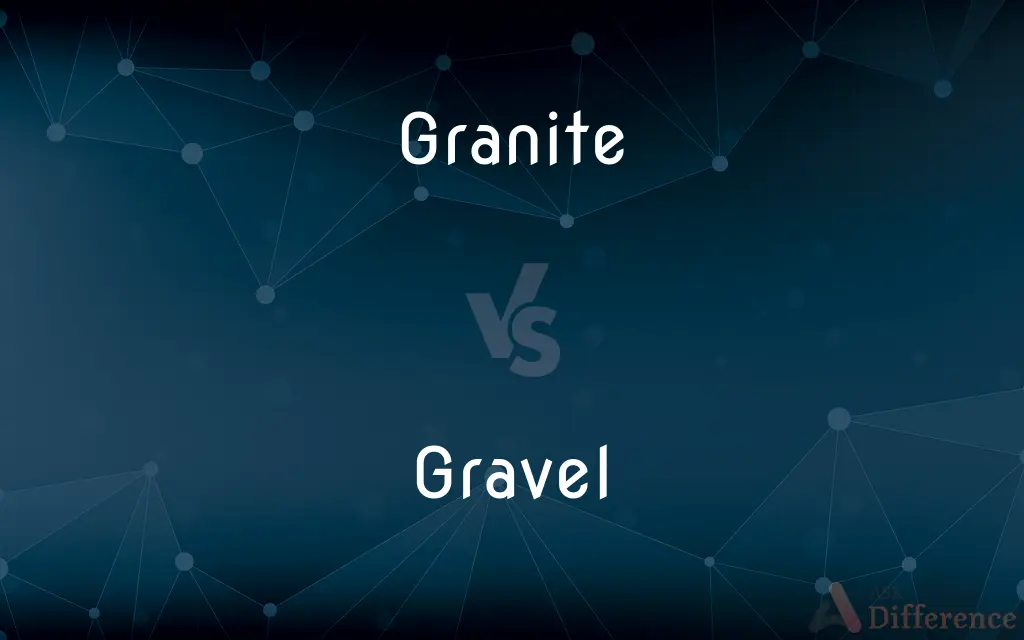Granite vs. Gravel — What's the Difference?
By Tayyaba Rehman — Updated on November 2, 2023
Granite is a hard, coarse-grained igneous rock, while gravel is a loose aggregation of small rock fragments.

Difference Between Granite and Gravel
Table of Contents
ADVERTISEMENT
Key Differences
Granite is an intrusive igneous rock, characterized by its grainy composition and predominantly composed of quartz and feldspar, alongside other minerals. It's known for its durability and is often used in construction and architectural applications. Gravel, on the other hand, is a collection of rock fragments with varying compositions and sizes, typically sourced from river beds or produced by crushing larger rocks.
While granite is a specific type of rock, gravel is a classification for small rock fragments, which could include granite among other types of rocks. Granite is often used in its large, solid form for things like countertops and monuments, whereas gravel is used for applications requiring aggregate, such as road construction and driveways.
The creation process for granite involves the slow crystallization of magma beneath the Earth's surface, giving it a uniform and often speckled appearance. Gravel's formation, however, can result from the breakdown of various rock types, including granite, through natural weathering and erosion processes, leading to a more varied appearance.
Durability is a hallmark of granite due to its hardened nature, making it a popular choice for surfaces that require resistance to wear and tear. Gravel is also durable but is primarily valued for its drainage properties and its utility in providing a stable, permeable surface for various infrastructure needs.
Granite is typically more expensive than gravel due to the processes involved in quarrying and cutting it to size. Gravel's cost is generally lower since it is easier to collect and requires less processing before use. Both materials are important in their respective domains but serve very different purposes in construction and design.
ADVERTISEMENT
Comparison Chart
Type of Material
Igneous rock
Rock fragments
Composition
Quartz, feldspar, mica
Varied, can include granite
Formation
Solidification of magma
Erosion and weathering of rocks
Common Uses
Construction, countertops
Driveways, landscaping
Texture
Coarse-grained, polished
Irregular shapes, varied sizes
Compare with Definitions
Granite
A very hard, granular, crystalline igneous rock.
Granite countertops add a touch of elegance to any kitchen.
Gravel
Loose, rounded stones typically used in driveways and walkways.
The crunch of gravel underfoot is characteristic of a country road.
Granite
Composed mainly of quartz and feldspar with minor amounts of mica, amphiboles, and other minerals.
The durability of granite is ideal for the city's bustling pedestrian sidewalks.
Gravel
Can be used to describe a texture, as in a gravelly voice.
His gravelly voice was distinctive and easily recognized over the phone.
Granite
Often polished for decorative use.
The lobby's polished granite floors reflected the morning light beautifully.
Gravel
Gravel is a loose aggregation of rock fragments. Gravel is classified by particle size range and includes size classes from granule- to boulder-sized fragments.
Granite
Used for making buildings and other structures.
The library was built with a foundation of solid granite.
Gravel
An aggregate of coarse stones used in construction.
The contractors ordered tons of gravel for the new parking lot's base layer.
Granite
Known for its strength and resistance to abrasion.
Granite tiles are preferred in high-traffic areas due to their resistance to wear.
Gravel
Small rocks, often from river beds, used in landscaping.
Gravel lined the garden paths, contrasting with the greenery.
Granite
Granite () is a coarse-grained igneous rock composed mostly of quartz, alkali feldspar, and plagioclase. It forms from magma with a high content of silica and alkali metal oxides that slowly cools and solidifies underground.
Gravel
An unconsolidated mixture of rock fragments or pebbles.
Granite
A common, coarse-grained, light-colored, hard igneous rock consisting chiefly of quartz, orthoclase or microcline, and mica, used in monuments and for building.
Gravel
(Medicine) The sandlike granular material of urinary calculi.
Granite
Unyielding endurance; steadfastness
A will of granite.
Gravel
To apply a surface of rock fragments or pebbles to.
Granite
(rock) A group of igneous and plutonic rocks composed primarily of feldspar and quartz. Usually contains one or more dark minerals, which may be mica, pyroxene, or amphibole. Granite is quarried for building stone, road gravel, decorative stone, and tombstones. Common colors are gray, white, pink, and yellow-brown.
Gravel
To confuse; perplex.
Granite
Toughness; the quality of having a thick skin or being rough.
Gravel
(Informal) To irritate.
Granite
A crystalline, granular rock, consisting of quartz, feldspar, and mica, and usually of a whitish, grayish, or flesh-red color. It differs from gneiss in not having the mica in planes, and therefore in being destitute of a schistose structure.
Gravel
(uncountable) Small fragments of rock, used for laying on the beds of roads and railways, and as ballast.
Granite
Plutonic igneous rock having visibly crystalline texture; generally composed of feldspar and mica and quartz
Gravel
A type or grade of small rocks, differentiated by mineral type, size range, or other characteristics.
Granite
Something having the quality of granite (unyielding firmness);
A man of granite
Gravel
A particle from 2 to 64 mm in diameter, following the Wentworth scale.
Gravel
Kidney stones; a deposit of small calculous concretions in the kidneys and the urinary or gall bladder; also, the disease of which they are a symptom.
Gravel
A lameness in the foot of a horse, usually caused by an abscess.
Gravel
(rare) Inability to see at night; night blindness.
Gravel
Gravel cycling, a discipline in cycling different from road cycling, mountain biking or cyclocross, for a large part on gravel roads, typically with a dedicated gravel bike
Gravel
(transitive) To apply a layer of gravel to the surface of a road, etc.
Gravel
To puzzle or annoy.
Gravel
To run (as a ship) upon the gravel or beach; to run aground; to cause to stick fast in gravel or sand.
Gravel
To check or stop; to confound; to perplex.
Gravel
To hurt or lame (a horse) by gravel lodged between the shoe and foot.
Gravel
Small stones, or fragments of stone; very small pebbles, often intermixed with particles of sand.
Gravel
A deposit of small calculous concretions in the kidneys and the urinary or gall bladder; also, the disease of which they are a symptom.
Gravel
To cover with gravel; as, to gravel a walk.
Gravel
To run (as a ship) upon the gravel or beach; to run aground; to cause to stick fast in gravel or sand.
When we were fallen into a place between two seas, they graveled the ship.
Willam the Conqueror . . . chanced as his arrival to be graveled; and one of his feet stuck so fast in the sand that he fell to the ground.
Gravel
To check or stop; to embarrass; to perplex.
When you were graveled for lack of matter.
The physician was so graveled and amazed withal, that he had not a word more to say.
Gravel
To hurt or lame (a horse) by gravel lodged between the shoe and foot.
Gravel
Rock fragments and pebbles
Gravel
Cause annoyance in; disturb, especially by minor irritations;
Mosquitoes buzzing in my ear really bothers me
It irritates me that she never closes the door after she leaves
Gravel
Cover with gravel;
We gravelled the driveway
Gravel
Be a mystery or bewildering to;
This beats me!
Got me--I don't know the answer!
A vexing problem
This question really stuck me
Gravel
Unpleasantly harsh or grating in sound;
A gravelly voice
Gravel
Small stones and pebbles, or a mixture of these with sand.
We added gravel to the driveway to improve traction during the winter.
Common Curiosities
What is granite?
Granite is a hard, coarse-grained igneous rock primarily composed of quartz and feldspar.
Is granite only used for countertops?
No, granite is also used for buildings, monuments, tiles, and many other applications.
How is gravel created?
Gravel can be naturally formed by the erosion of larger rocks or can be man-made by mechanically crushing rock.
Can gravel be made from crushed granite?
Yes, crushed granite can be a component of gravel.
Is granite durable?
Yes, granite is known for its durability and resistance to abrasion.
Are granite and gravel expensive?
Granite tends to be more expensive due to quarrying and cutting processes, while gravel is generally cheaper.
How do you maintain granite surfaces?
Granite surfaces should be cleaned with mild detergent and may require periodic sealing to prevent stains.
How is granite formed?
Granite forms from the slow cooling and solidification of magma beneath the Earth's surface.
What is gravel used for?
Gravel is used for construction purposes, driveways, landscaping, and as a drainage medium.
Can gravel include granite?
Yes, gravel can include small pieces of granite among other rock types.
Is gravel environmentally friendly?
Gravel is eco-friendly as it provides drainage and does not typically require chemical treatments.
Is all gravel the same?
No, gravel varies in composition, size, and shape based on the source rocks and method of production.
How do you choose between granite and gravel for a project?
The choice depends on the project's requirements for aesthetics, durability, budget, and function.
Why is gravel used on driveways?
Gravel is used on driveways for its permeability, durability, and ease of installation.
Can granite be used outdoors?
Yes, granite's durability makes it suitable for outdoor use in climates that do not have severe freeze-thaw cycles.
Share Your Discovery

Previous Comparison
Psychosis vs. Neurosis
Next Comparison
Specialist vs. GeneralistAuthor Spotlight
Written by
Tayyaba RehmanTayyaba Rehman is a distinguished writer, currently serving as a primary contributor to askdifference.com. As a researcher in semantics and etymology, Tayyaba's passion for the complexity of languages and their distinctions has found a perfect home on the platform. Tayyaba delves into the intricacies of language, distinguishing between commonly confused words and phrases, thereby providing clarity for readers worldwide.













































